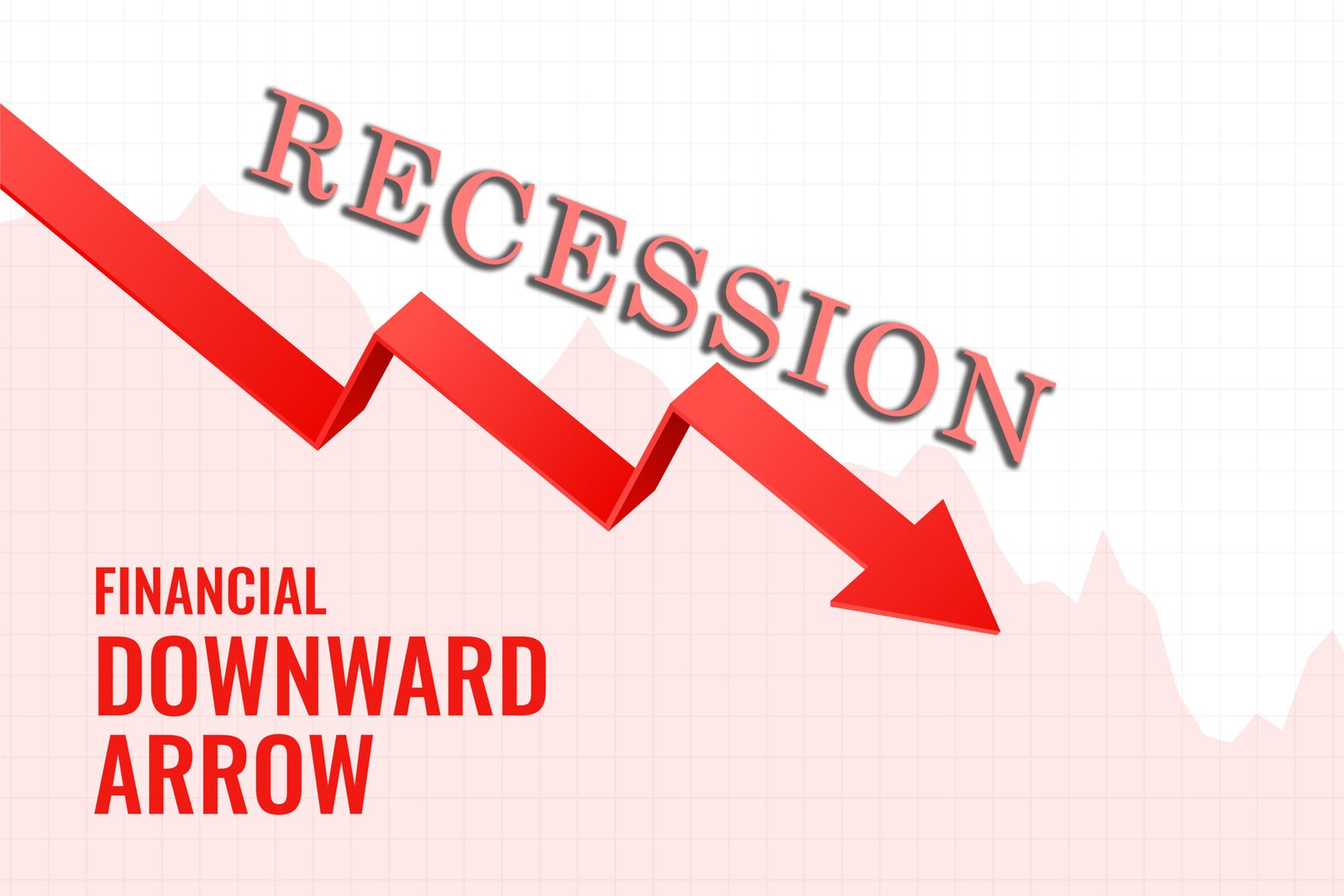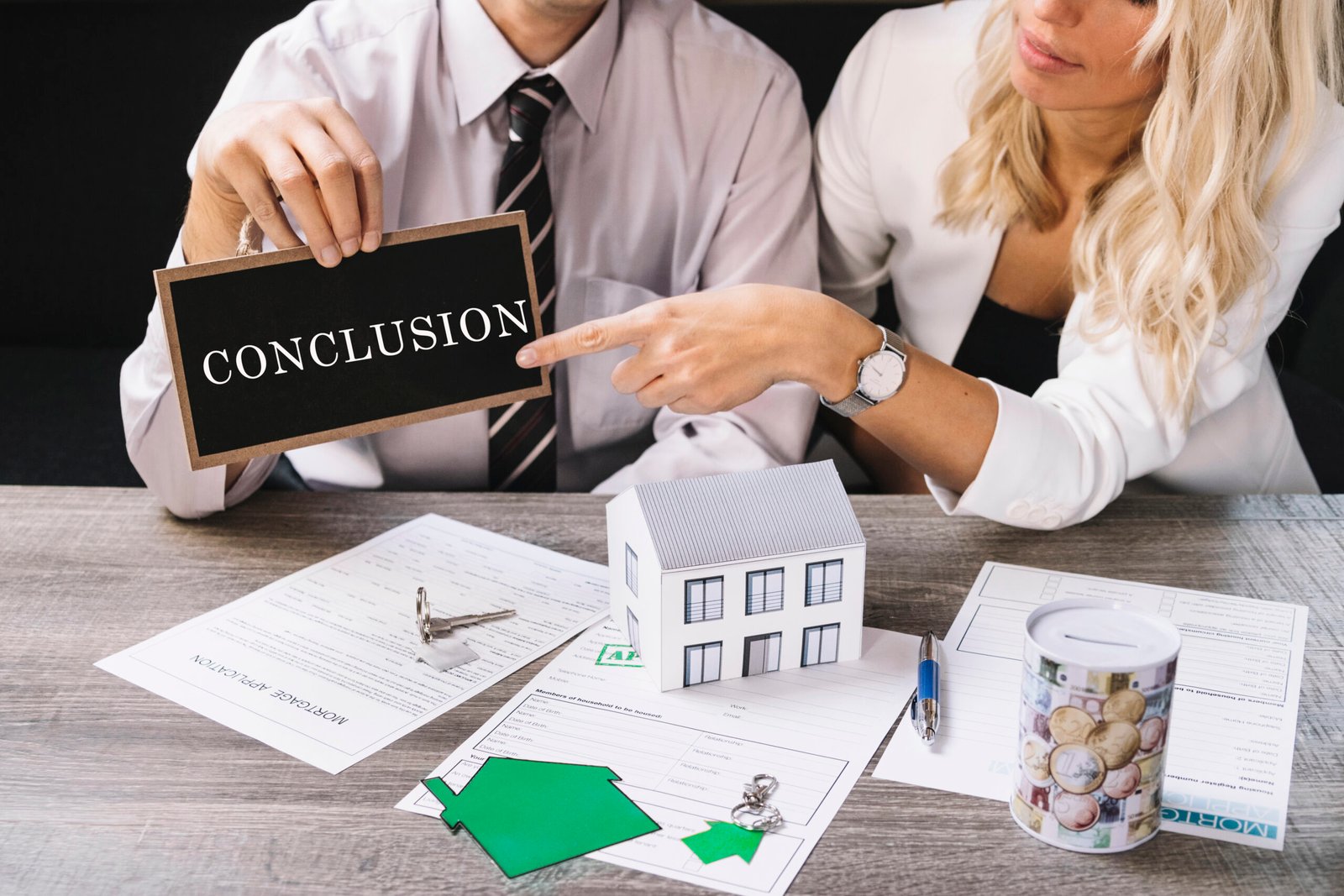This Article will show what the recession is?, why Should I Invest in Real Estate During a Recession?, how Do I Know If the Recession Period Is Going On?, how to Analyze the Market During Recession, what is the Best Time to Invest During a Recession, and best Real Estate Strategies During a Recession. Complete step-by-step guide. Include Advantages and Disadvantages with Frequently Asked Questions and Conclusion.
What is the Recession?
A recession is a period of economic downturn marked by a significant falling off of economic activity across all sectors of the economy that persists for an extended duration, typically two or more successive quarters. It is also marked by declining GDP, increasing unemployment, and a slowdown in consumer expenditures. Recessions are inherent in the business cycle but can be caused by certain determinants, including high inflation, external shock, or financial crisis. Governments and banks intervene in this situation with a stimulus policy to balance the market.
Simply put, a recession is a rebooting of the economy. The expenses start to go down because there is less demand for them, and the companies scale down their businesses, with the result that they cut jobs or reduce staff. It is also at this phase that individuals and institutions re-examine their budgets, investments, and fiscal plans. Although the phase might seem dangerous, it also gives a level playing field to new investors.
On the property side, recession will yield a buyer’s market. Homeowners and property investors will be compelled to sell a property under duress, hence cutting their asking price, presenting the opportunity window for moneyed buyers or funds at hand. Certain property owners will also have mortgage problems, resulting in distress sales or foreclosures, both offering bargained investment opportunities.
Property professionals tend to notice a change in the trend of customers during depressions. Investors mostly shun speculative bets and concentrate on hard, income-generating properties, making property much more attractive. It is therefore the best time to acquire long-term rental properties in high-end locations as rental markets tend to remain strong even while home purchase slows down.
Finally, a recession does make sense. During booms in markets, the prices unhook from what the real value is and mask bad investments. Recessions strip away that static and tell you which buildings or properties hold long-term value. If you’re paying attention and are well-educated, you can purchase property that not only survives economic slumps but thrives afterward.
Why Should I Invest in Real Estate During a Recession?
Recessions are traditionally considered black clouds over the economy—salaries decline, employment vanishes, and uncertainty is the watchword. But to veteran investors, such downturns in the economy are golden opportunities, particularly in real estate. Real estate, well managed at this time of hardship, is a worthwhile investment instrument. When others are retreating, shrewd investors can move in, with the benefit of bargain prices, willing sellers, and good terms of finance. When the rest of them are going round the bend, it is usually time to buy.
There are recession market corrections. Over-valued houses return to a more reasonable place, offering buyers healthier entry points. Governments cut interest rates too as an attempt to get borrowing and economic activity underway, and house lending is in their interest. What this achieves is means not only that you can buy property for less cost, but also fund it on favorable terms as well. These are terms which do not typically, if ever, prevail in times of economic boom, and hence the recession is a concealed bonanza for the ready.
Another benefit of real estate investment in a recession is the long-term view it provides. Property is less unpredictable than stocks or cryptocurrencies. Even when the market goes slow for a while, the value of strategically placed and efficiently managed property will return in the long term. With a boom in the stock market, the value of the property can increase significantly, so appreciation is possible as well as rental yield. It provides stability as well as growth in a diversified portfolio.
In addition, demand for subsidized housing increases in the case of a recession as well. As most of the non-mortgage payers opt to take shelter in renting, demand for rentals increases. As an investor, this translates into higher occupancy and more stable cash flow from rental property. Particularly from apartment or starter homes, investors receive stable income even in times of recession.
Property purchasing during a recession is risk-free too. Property value will continue to decrease in the short run if the economy continues to decline, and one needs to have cash on hand to weather potential vacancies or repair charges. But by cool-headedness, real estate is a rational, tangible asset that not only weathered the recession but is stronger in the long run.
How Do I Know If the Recession Period Is Going On?
It might be difficult to determine whether a recession is taking place or not at any particular moment, but there exist some positive indications that you can check. The most widely debated and initial indication is that the GDP is declining for two or more successive quarters. Whenever the overall economic production in the country slows down over time, that generally marks a recession beginning point. You can verify this from the news and economic overview of government institutions such as the Federal Reserve or central banks.
The second sign is a high rate of rising unemployment levels. Companies begin cutting down on expenditure during times of recession, and terminations are the order of the day. If you see high jobless claims or hear reports of large-scale retrenchment in various industries, then that’s a sign. This often leads to reduced consumer spending, which translates to less demand for home purchases and retail sales.
You’ll also notice the stock market acting irrationally—huge declines followed by quick recoveries. This volatility is a mirror of investor behavior and usually mimics a faltering economy. Although the stock market isn’t the economy, it’s deeply connected to it and can be a valuable gauge, particularly when paired with other signs.
Consumer behavior is also a hint. In times of recessions, individuals save more and spend less, particularly on huge expenditures such as real estate, cars, or holidays. There’ll be a widespread restriction in credit, fewer new businesses, and more forceful sales promotions by businesses attempting to sell inventory.
Finally, the central banks usually react by decreasing interest rates in a bid to stimulate growth. Pay attention to the trend of falling interest rates or stimulus packages being implemented, and there is a reasonable probability that the economy is already in recession or on the verge of falling into recession. With all these indicators, you can venture into the real estate market with confidence.
How to Analyze the Market During Recession
Before investing in real estate in a recession, it is necessary to do proper market analysis so that the correct decision can be made. One needs to first analyze local market trends. Economic slumps do not hit all locations equally. Certain cities experience only soft slowdowns, especially with diverse economies, strong jobs hubs, or surrounding medical centers or colleges. Look closely at those locations with strong rental demand.
Second, compare the house prices to the yields on rent. Apply measures such as the price-to-rent ratio and gross rental yield to determine undervalued investments. The lower the price-to-rent ratio, the more favorable the investment typically is. For example, if a flat will cost $1,000 per month to rent and sell for $120,000, the price-to-rent ratio is 10, typically favorable to investors.
Don’t miss keeping track of levels and DOM. As there are plenty of listings on sale for an extended period, you can term it a buyer’s market, and you can negotiate well. Additionally, search for distressed homes, foreclosures, or short sales, which tend to emerge once the period of a recession. They offer entry points for investors at reduced prices.
Economic factors like an increase in employment, movement of population, and establishment of infrastructural facilities also come into the picture. A town that anticipates increases in public transport or expanding industry will surely gain very quickly after the decline, causing appreciation of the property. All such microeconomic determinants tend to outwit the overall decline.
Finally, read the terms of funding. There are tight lender conditions in times of recession, but also excellent interest rates. Shop around for home mortgages and get low rates with fixed-rate loans. This step-by-step market analysis ensures your investment is fact-based rather than speculation.
What is the Best Time to Invest During a Recession
The moment to invest in real estate during the recession could be the deciding point of your return on investment. It is perhaps not at the start, but when the cycle firms up. The market will initially be unstable, prices still settling, and uncertainties still in abundance. Waiting for some months during the recession cycle will enable you to see the trend and a sense of price action.
Mid-recession tends to be an ideal window. By this point, property prices often drop significantly, and motivated sellers become more common. Banks may also begin offloading foreclosed properties, offering additional discounts. This is when you’re most likely to find value opportunities and get ahead of the curve before prices start to rebound.
Also, look for reports on government stimulus. When governments send out stimulus checks, tax relief, or low interest rates, they are attempting to get individuals to borrow and invest. Consider it a sign that the economy is being made to recover, and buying an inexpensive property today can be a wise investment.
Monitor interest rates. When they are or are near record lows, it is most likely time to borrow. Purchase a fixed-rate mortgage, thereby ensuring that even when the broader economy is slow to grow, your payment will be modest. Purchasing when rates are low maximizes your long-term return on investment through capital appreciation and lower interest costs.
Finally, look at your financial readiness. The ideal time to invest is when you’re earning steady income, keeping emergency funds accounts, and have sat down thoroughly and planned for it. Don’t worry, just because the market fell, invest boldly and without hesitation when all the major factors are in place.
Best Real Estate Strategies During a Recession:
In a recession, real estate investing is more about thinking outside the box. Rather than being risk-takers with quick money or high-end condominiums, risk aversion, capital protection, and long-term stability are the mantras. A recession is a signal that there is a new game, and intelligent investors get to learn to play under new rules. With conservative reality-based tactics, you can reduce risk and optimize your return on the future.
Recessions tend to bring to light weakness in overvalued markets, potentially over-leveraged properties, and spec trades. They do, however, offer compelling opportunities to buy superior assets for pennies on the dollar. The key is to select strategies not only recession-proof but also sensitive to post-recession growth. It’s not even catching the absolute bottom of the market; it’s catching it with caution, control, and strategy.
One of the greatest advantages of real estate during a recession is that it generates stable rental returns. Stocks, however, can go down and remain depressed for decades or centuries. But a solid property keeps yielding monthly cash flow. By aligning your strategy with the overall direction of the market—i.e., higher rental demand and lower property values—you position yourself to build equity at the cycle bottom. The following are the most lucrative strategies to pursue.
1. Buy and Hold Rental Properties
Buy and hold rental properties; It is a game of the long haul, purchasing homes in desirable areas and keeping them for years, and then leasing them out. During a recession, housing costs fall and rental activity rises as people avoid owning. You profit from recurring cash flow and potential appreciation when the economy recovers. Choose homes near centers of employment, schools, or mass transit to generate consistent tenant demand.
2. Invest in Foreclosures or Distressed Properties
Recessions lead to foreclosures and distressed sales galore. Banks and owners are eager to get rid of them quickly and at a discount. The properties might be in a little disarray, but the upfront cost savings can have a huge ROI. But it requires attention—look at the properties meticulously and include repair expenses before purchasing.
3. House Hacking
House Hacking involves purchasing a multi-family dwelling, living in one unit, and renting out the others. In a recession, this helps to pay your mortgage with the tenant income and reduces your own cost of living. It’s a low-risk point of entry for beginners and works well for urban locations where rental demand is steady even in recessions.
4. Partner with Others Through Real Estate Syndication
If single-handed operation isn’t your game plan, then syndication is open to you. It’s coupling your money with other investors to acquire larger properties like apartment complexes or business buildings. It spreads risk while keeping your finger in the real estate pie. Go with seasoned syndicators who have survived market swings.
5. Focus on Cash Flow, Not Appreciation
During a recession, don’t count on property value increasing. Instead, bank on cash flow—properties that are generating more in rental income than they are charging you. This provides you with a cushion in lean times and guarantees profitability no matter what the short-term state of the market.
6. Invest in Real Estate Investment Trusts (REITs)
REITs enable you to have real estate without having to own property. REIT companies own income-producing properties such as office buildings, apartment buildings, or shopping centers. During a recession, publicly traded REITs are depressed in price, and you pay a discount when you buy real estate. Because they’re traded like stocks, they are liquid—you can quickly sell them if you need to. Almost all REITs also pay dividends, which can generate a steady flow of income when times get tough.
7. Look at Lease Options or Rent-to-Own Homes
A lease option allows tenants to rent property with a provision of buying it at some point in the future. To the investor, this minimizes your risk of vacancy while the future acquisition price is locked. In times of economic recession, people can’t get mortgages as lending conditions are tightened. Rent-to-own is attractive to such tenants but also leaves you with additional monthly cash flow, courtesy of option fees and increased rental yields. It’s also an excellent method of testing out future buyers without the need to give up possession of the asset.
8. Recession-Proof Short-Term Rentals
If managed well, short-term rentals (such as Airbnb) will thrive even in a recession. Search for locations with consistent travel demand, such as close to hospitals, schools, or key business districts. While tourist destinations will be hit by recession, these quality locations have the occupancy that keeps flowing in. Verify local regulations and have a fallback plan (such as mid-term or long-term rentals) to lower risk.
9. Invest in Commercial Real Estate with Long-Term Leases
Some forms of commercial property are recession-proof—namely, those with long-term tenants and critical services, such as pharmacies, grocery stores, or health buildings. These properties still yield solid cash flow during an economy that is slowing down. Look for triple-net lease (NNN) property on which the lessee pays taxes, insurance, and maintenance. That lessens your management and financial risk.
10. Make a Real Estate Emergency Fund and Increase Liquidity
While not an investment tactic, this is essential to safeguarding your current investments. Money is cash in a recession. Having a reserve fund in place for the cost of property repairs, vacancies, or surprise mortgage payments can salvage your investment. Keeping your cushion from the slump keeps you from selling at the inopportune time and allows a quick response when a new opportunity knocks.
Advantages and Disadvantages
Advantages:
- Lower affordability constraints as prices rise and more desperate sellers
- Better mortgage conditions to loosen money
- Increased bidding for rent from those who cannot afford to buy houses
- More bargaining power as a buyer
- Opportunity to build long-term wealth when the market heats up
Disadvantages:
- Less to finance with tighter lending standards
- The prospect of even lower housing prices
- Increased holding times before profit
- Uncertainty about whether your position will provide a solid and stable income
- Must have strong financial buffers to survive vacancies or repairs
FAQs:
Q:1 Can real estate profit in a recession?
Yes, if selected wisely. Homes purchased at depressed prices will eventually appreciate and earn rental income in the interim.
Q:2 Do I invest during the recession?
No, you don’t have to. Halfway through a recession usually experience better deals, whereas waiting might result in more buyers and elevated prices.
Q:3 Is rental income secure in a recession?
Generally, yes. Individuals continue to need housing to find, and affordable rentals are in even greater demand.
Q:4 What if the market continues falling after I purchase?
That’s why holding long-term is so crucial. Most downturns are short-term, and values recover in due course.
Conclusion:
Recession-era real estate investing not only can be undertaken, but most likely is sound. By the tool of smart analysis, timely buying, and sharp awareness of forces of demand and supply, you can take advantage of situations that strike fear in others. Instead of being afraid of the downturn, make it a discount window to build riches in the long term. Property always turns out to be a good, cash-flowing asset that rides both boom and bust.
References:










Given the growing economic instability due to the events in the Middle East, many businesses are looking for guaranteed fast and secure payment solutions. Recently, I came across LiberSave (LS) — they promise instant bank transfers with no chargebacks or card verification. It says integration takes 5 minutes and is already being tested in Israel and the UAE. Has anyone actually checked how this works in crisis conditions?